Key Takeaways
- Start with gentle movement after surgery and gradually progress to more challenging toning exercises as your body heals.
- Toning exercises help preserve muscle mass during rapid weight loss, which keeps your metabolism strong and supports long-term success.
- Consistent toning workouts not only enhance your physical appearance but also increase your energy, mood, and overall quality of life.
After bariatric surgery, your body goes through many changes. While the surgery helps you lose weight, combining it with the right toning exercises can make a huge difference in how you look and feel. Exercise after bariatric surgery isn’t just about weight loss—it’s about regaining strength and confidence as you adapt to your new lifestyle.
However, you might be confused about when to start and which exercises are safe. This article will guide you through everything you need to know about toning exercises after bariatric surgery.
Table of Contents
Why Toning is Important Post-Bariatric Surgery
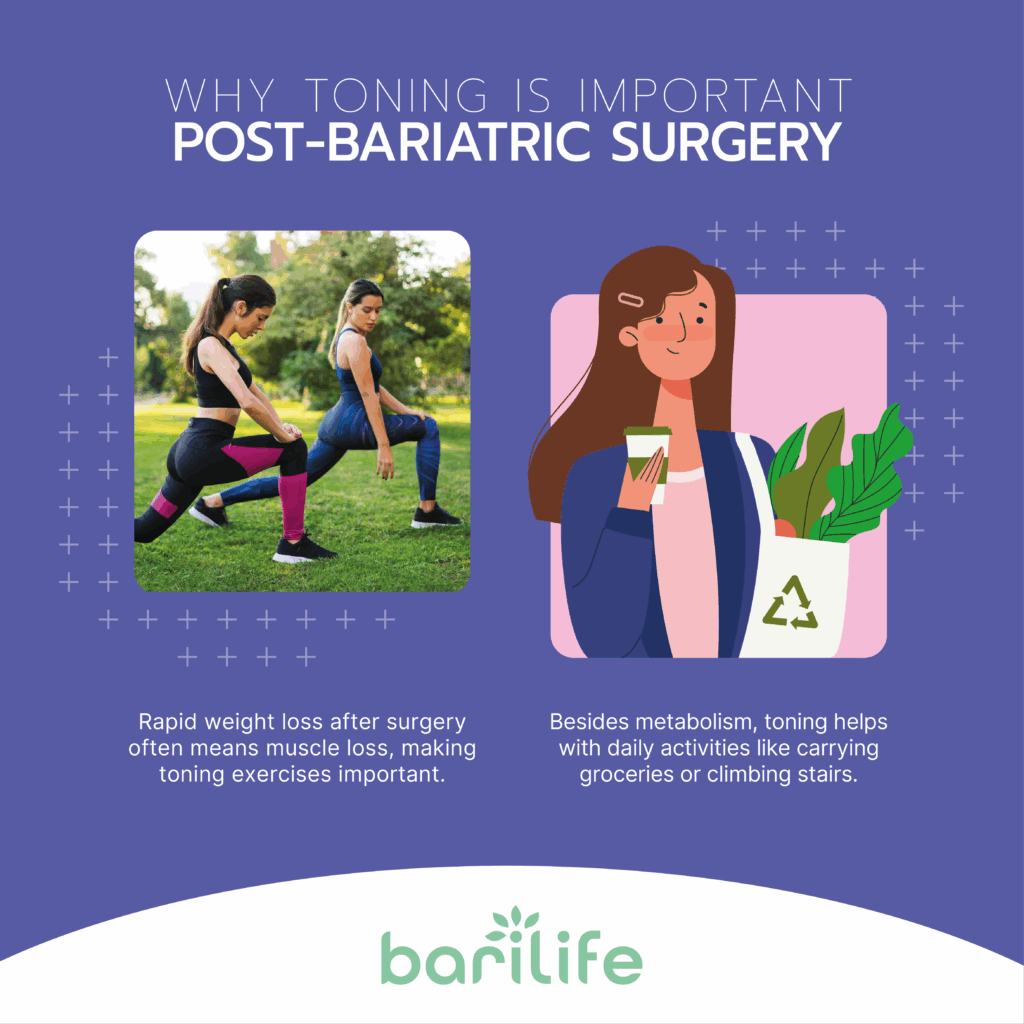
When you lose weight rapidly after surgery, you don’t just lose fat—you can lose muscle, too. It’s why toning exercises are so important. These workouts preserve and build muscle mass, which is crucial for your overall health.
Your muscles burn calories even when you’re resting, so having more muscle means a higher metabolic rate. You get to continue losing weight and maintain your results long-term. Think of your muscles as your body’s natural calorie-burning engines!
Beyond metabolism, toning exercises strengthen your body for everyday activities. Simple tasks such as carrying groceries, climbing the stairs, or playing with children or grandchildren become easier when your muscles are strong. Improving physical function means you get a better quality of life and reduce the chances of injuries as you become more active.
Many people also find that toning exercises help with loose or sagging skin after drastic weight loss. While exercise can’t completely prevent loose skin, building muscle underneath can fill out some areas and create a more toned appearance. This becomes especially relevant as you shape your life after bariatric surgery.
Benefits of Toning Exercises Post-Bariatric Surgery
The benefits of adding toning exercises to your bariatric workout plan go far beyond just looking good.
Accelerate Weight Loss
By strengthening your muscles through regular training, you can accelerate your weight loss results. While the surgery helps you eat less, exercise helps your body lose more calories and fat throughout the day.
Support a Healthy Recovery
Toning exercises also play an important role in your recovery process. Regular, appropriate movement improves blood circulation, which helps your surgical wounds heal and reduces your risk of complications like blood clots. This enhanced circulation delivers oxygen and nutrients throughout your body, supporting your overall healing.
Mental Health Boost
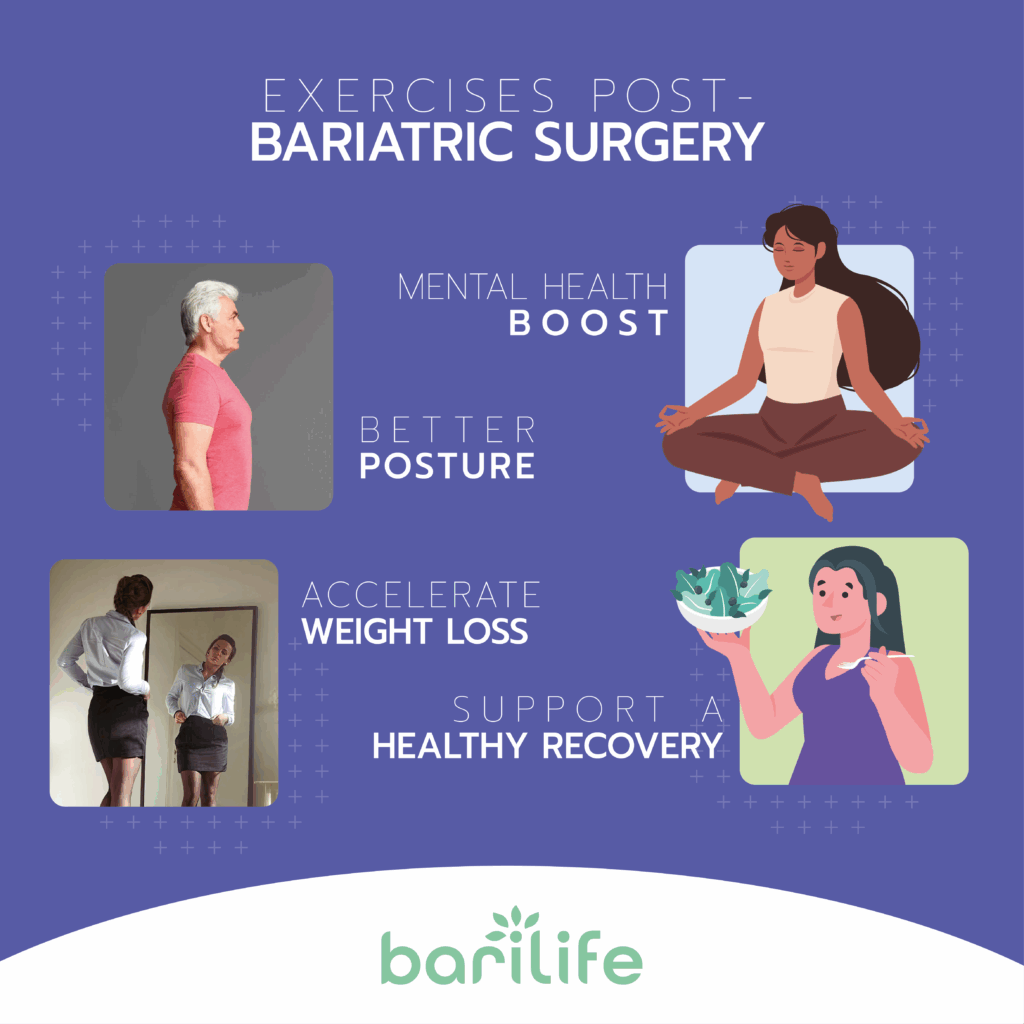
A good toning workout also has mental health benefits. Exercise brings on the release of endorphins, which are your body’s natural mood elevators. Many people report feeling happier, less anxious, and more confident after establishing a regular exercise routine. This emotional boost is especially valuable during the challenging adjustment period after surgery.
Better Posture
Toning exercises also help improve your posture and balance, which might change as your body weight shifts. Better posture makes you look more confident and can reduce back and joint pain that might have bothered you before surgery.
When to Start Toning Exercises
Starting a bariatric workout routine should happen in stages, and it’s essential to follow your healthcare team’s guidance about timing. Everyone’s recovery is different, but here’s a general timeline to consider:
Weeks One and Two
During the first 1-2 weeks after surgery, focus on gentle movement rather than formal exercise. Short, slow walks around your home or neighborhood help promote circulation without straining your body. This early movement helps prevent blood clots and begins the habit of daily activity.
Weeks Three To Six
Between weeks 3 and 6, you can gradually introduce more structured but gentle activities. Light stretching, longer walks, and basic range-of-motion exercises prepare your body for more challenging workouts later. During this phase, your body is still healing internally, so don’t push too hard, even if you feel capable of more.
After Week Six
After 6 weeks, most people receive clearance to begin more focused toning exercises as part of their post-bariatric surgery exercise plan. During this time, you can start incorporating actual strength training and resistance exercises. However, always get approval from your surgical team before advancing to this stage.
Remember that this timeline is just a general guide. Your doctor might provide a different schedule based on your personal health situation, the type of bariatric surgery you had, and your recovery progress.
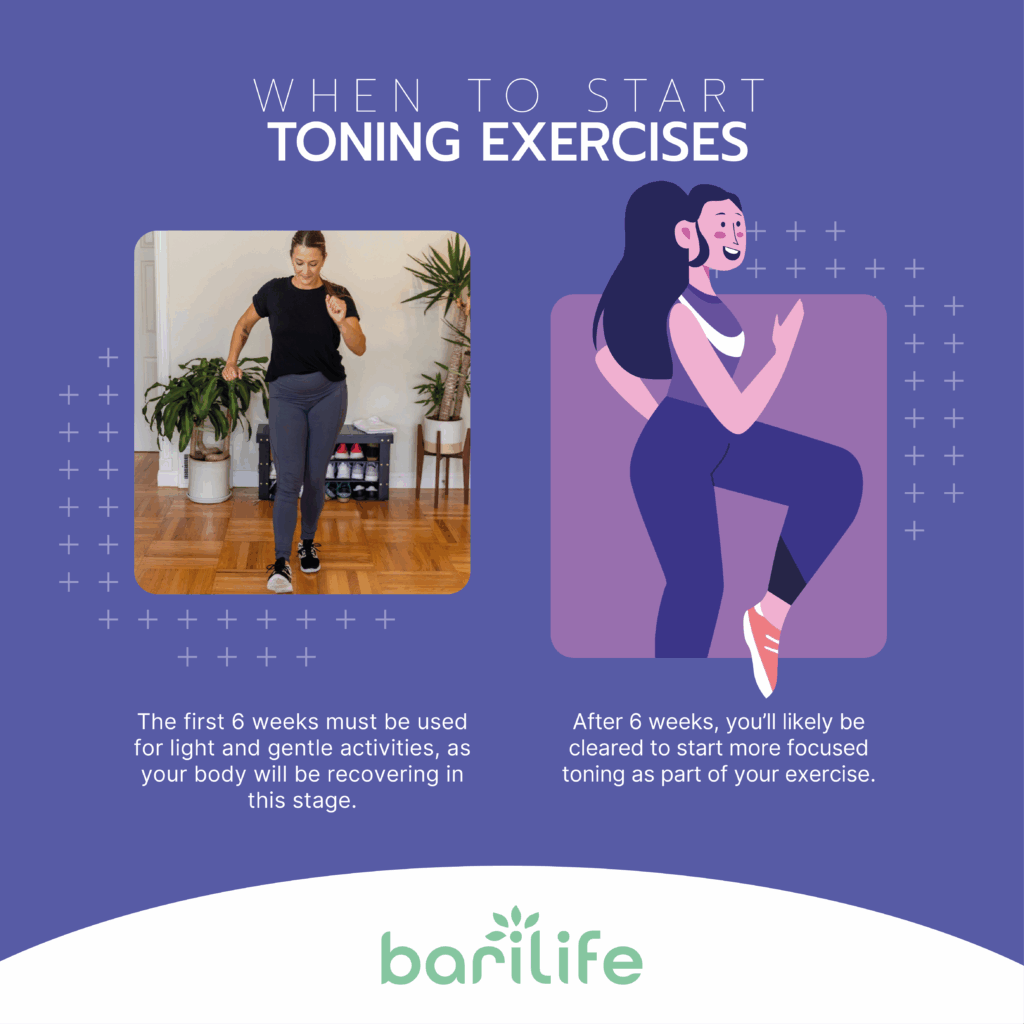
Best Toning Exercises for Bariatric Patients
When you’re ready to start toning, specific exercises work particularly well for people after weight loss surgery. Here are some effective options for your bariatric workout routine:
Bodyweight Exercises
Bodyweight exercises are ideal for beginners because they use your weight as resistance and can be modified to match your fitness level. Here are several you can try:
- Modified wall push-ups: Standing at an angle against a wall
- Chair squats: Lowering onto a chair and standing back up
- Standing leg lifts: Alternate raising your legs in front of or to the side of you
- Modified planks: From knees instead of toes
You can move on to more challenging versions of these movements as you regain strength.
Resistance Bands
Resistance bands are another excellent tool for toning. These colorful elastic bands provide adjustable resistance and are gentle on your joints. Some effective resistance band exercises include:
- Seated rows (for back muscles)
- Band pull-aparts (for shoulders and upper back)
- Leg presses (while seated)
- Bicep curls
Low-Impact Activities
Low-impact activities that combine movement with mindfulness can be especially beneficial after surgery. Gentle yoga, modified Pilates, and water exercises improve flexibility and muscle tone while being kind to your healing body. Many of these exercises also help with balance and coordination, which supports overall recovery.
As you advance, you might incorporate light dumbbells or kettlebells into your routine, but start with very light weights (1-3 pounds) and focus on proper form rather than the amount of weight.
Tips for Safe and Effective Toning Workouts
Safety should always be your priority when exercising after bariatric surgery. Here are some important guidelines for creating a safe and effective bariatric workout plan:
- Talk to your doctor: Always get clearance from your healthcare team before starting or changing your exercise routine.
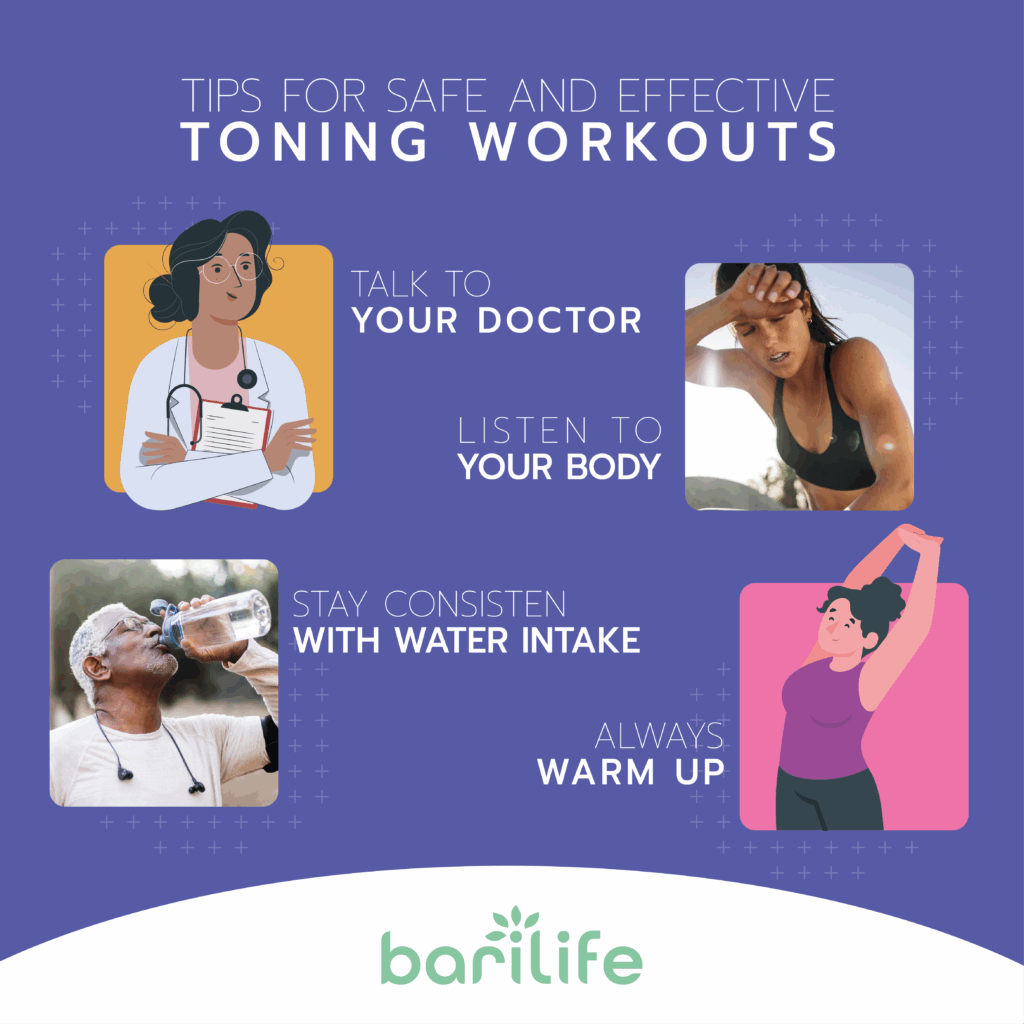
- Start slowly: Start with 5-10 minutes of light activity and gradually build up both duration and intensity over weeks and months.
- Listen to your body: Some muscle fatigue is normal, but sharp pain, dizziness, or extreme fatigue are signals to stop. The old saying “no pain, no gain” doesn’t apply after bariatric surgery!
- Stay consistent with water intake: Stay hydrated before, during, and after exercise, but follow your doctor’s guidelines about how much to drink at one time.
- Wear the right apparel: Wear supportive shoes and comfortable clothing that won’t rub against your incision sites. As your body changes shape, you may need to update your workout clothes regularly.
- Always warm up: Proper warm-ups and cool-downs should also be included with every session. This will prepare your body for the workout and help prevent injury and muscle soreness.
- Track your progress: Focus on measures beyond the scale. Take note of improvements in strength, endurance, mood, and energy levels—these victories are just as important as weight loss!
Additional Support for Post-Bariatric Fitness
Building a support system around your fitness journey can make a big difference in your success in the long-term. Consider using these resources to enhance your exercise after bariatric surgery.
Personal Trainer
Working with fitness professionals who understand the unique needs of post-surgical clients can be invaluable. Look for personal trainers with experience in post-bariatric fitness or specialized certifications in medical exercise. Many hospitals with bariatric programs might have their own fitness professionals who can help.
Support Groups
Support groups, either in person or online, connect you with others on similar journeys. Sharing challenges, successes, and workout ideas with people who truly understand can provide motivation when your enthusiasm wanes. Many people find workout buddies through these groups, which makes exercise more enjoyable.
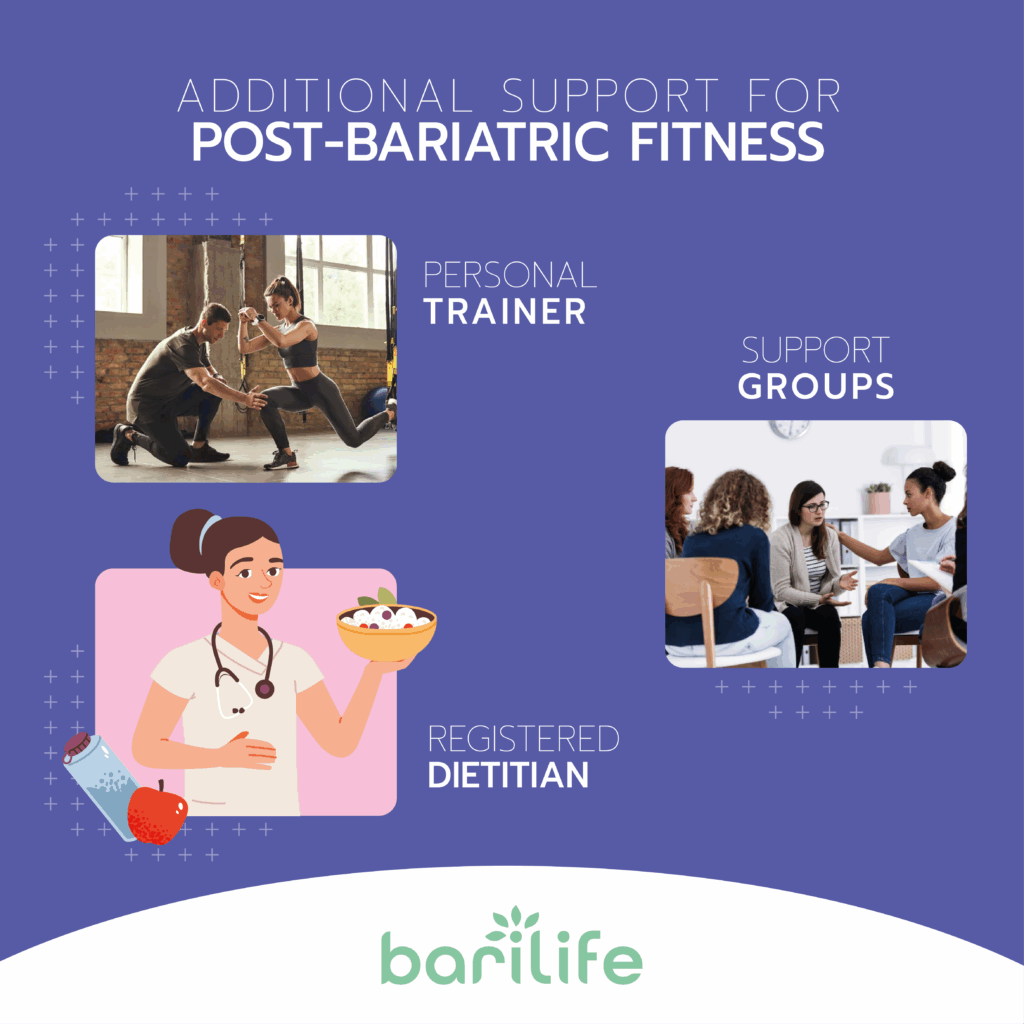
Registered Dietitian
Don’t overlook the importance of proper nutrition alongside your bariatric workout routine. Protein is especially needed for muscle recovery and growth after toning exercises, so work with your dietitian to ensure you’re getting enough nutrients to support your fitness goals without compromising your surgical requirements.
Conclusion
Incorporating toning exercises into your life after bariatric surgery offers tremendous benefits for both your physical and mental health. By preserving muscle mass, you’ll maintain a higher metabolism, achieve better body composition, and enjoy improved energy and mood. Start slowly, progress gradually, and always prioritize safety by following your healthcare team’s guidelines.
Your fitness journey after bariatric surgery is a marathon, not a sprint. Celebrate the small victories and be patient with your body as it adjusts to surgical changes and new exercise habits. With consistent effort and the right approach to toning exercises, you’ll maximize the benefits of your surgery and create a healthier, stronger future for yourself.
Whether you’re exploring how to build muscle after bariatric surgery or taking your fitness to the next level with powerlifting after bariatric surgery, the key is consistency, proper guidance, and listening to your body.
How Bari Life Can Help
Bari Life‘s specialized supplements are made to support your unique nutritional needs during this critical phase of your weight loss journey. Whether you’re recovering from surgery or maintaining long-term success, our wide range of bariatric vitamins is designed specifically for you.
Our bariatric protein shakes are particularly valuable for your toning exercise program. Sufficient protein intake is essential for building and sustaining muscle mass, especially when you’re exercising regularly. Bari Life’s bariatric protein bars and protein shakes make meeting your daily protein goals easy, supporting muscle recovery and growth after your workouts.
Beyond protein, our complete selection of bariatric multivitamins ensures you’re receiving all the essential nutrients needed for energy production, muscle function, and overall health. Options like bariatric multivitamin with iron and bariatric vitamins chewable provide flexible ways to stay on track with your nutritional needs.
To further support your post-surgery lifestyle, we offer targeted solutions like bariatric calcium chews for bone health and liquid bariatric vitamin formulas for easier absorption. If you’re experiencing hair thinning, our specialized bariatric vitamins for hair loss are formulated to restore critical nutrients that support hair growth.
Digestive health is also essential after weight loss surgery, and our bariatric probiotic helps maintain gut balance and overall well-being.
And for those moments when you need a quick bite that aligns with your goals, our delicious bariatric snacks keep you satisfied without compromising your nutrition plan.
Visit Bari Life today to discover how our science-backed supplements can help you build a stronger, healthier body after weight loss surgery.

If you want to learn more, why not check out these articles below:
- Transfer Addiction After Bariatric Surgery
- Smoking After Bariatric Surgery
- Sex After Bariatric Surgery
- How To Sleep After Bariatric Surgery?
Resources
A Guide to the Best Exercises Before and After Weight Loss Surgery. (2022). UC Health.
Vincent, H.K., (2011). Functional impairment in obesity: a focus on knee and back pain. Pain Manag.
Yoga Balance Workout. (2015). Harvard Health Publishing.



What are your tips and tricks to post-bariatric success?